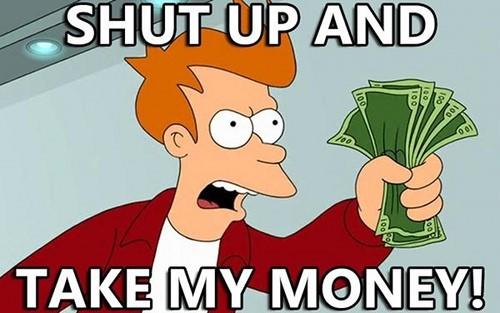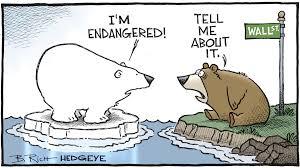Submitted by Harris Kupperman from Adventures in Capitalism
A very smart and wealthy friend always reminds me that you have to invest in the market landscape that exists today—not the one you wish for. That said, I like to think of myself as a pragmatist who views the capital markets through the lens of financial history. That history would imply that the Fed should keep hiking rates and ignore the yield curve. In fact, if I were the chair of the Fed, I’d have an emergency 50bps hike today; just to show that I’m serious about putting the economy back on a sound footing for future growth.
To start with, capital markets exist to finance businesses—they should not exist to drive economic growth through a distributed wealth effect that narrowly benefits the wealthy who have capital market assets. The state of affairs that exists today, is an anomaly historically—it isn’t sustainable and shouldn’t be supported by the Fed at the expense of the rest of the economy. Capital market bubbles are disruptive and destructive of long-term GDP growth. Today’s bubble is unparalleled by almost any historical standard—only made possible by abnormally cheap credit along with an implicit Federal Reserve put.
Since the Fed sets the cost of capital, they need to change priorities from supporting financial bubbles to supporting the actual economy. The cost of capital should be at a level that allows businesses to profitably re-invest in growth endeavors. If capital is so cheap that returns on capital investment are minimal, businesses instead focus on driving returns through financial engineering. This isn’t only because they’re obsessed with their stock options—it is because they now have no viable investment opportunities in a world where there is endless competition funded with almost free and limitless capital.
The rapidly expanding Profitless Prosperity Sector is competing with and impairing large swaths of the economy. How do you compete with a business that is totally indifferent to profitability as long as there is enough revenue growth to support a future capital raise? It’s as if a malignant Ponzi Sector is now consuming the real economy. This Ponzi sector was created and propagated by free money from the world’s central banks.
Have recent Federal Reserve rate increases taken a bite out of animal spirits? Let’s be serious here; we’re a few dozen basis points removed from a nearly trillion-dollar bubble in fake blockchain currencies. At this time last year, anyone could put a dog on a coin and have it valued at 2 billion dollars—Bitcoin is still worth $9 billion. We’re 25 basis points removed from companies like Tilray (TLRY – USA) issuing debt where the interest expense was multiples on next year’s expected revenue—forget profits which will likely never exist. If investors were this lax with their underwriting, capital is still far too easy. As I’ve shown many times on this site, whether it’s shale oil or shipping, shared office space or start-up restaurants, if capital is too plentiful, it is invested in too many ventures that crush everyone’s returns.
But Kuppy; doesn’t the shape of the yield curve prove that the Fed has gone too far? In a global market, where central banks have pushed yields into negative territory and hoarded other countries’ bonds while trying to depress their own currencies, yield curves have stopped mattering. Due to manipulation, I believe that the yield curve is no longer the same indicator that it was in past periods.
What will happen if rates increase? You’ll see a decline in asset values, you’ll probably see something of an economic slow-down. The Ponzi economy will collapse as investors start asking if these businesses will ever hit profitability, instead of asking what the Series D round will get priced at. Basically, there will be a bunch of pain.
Then there will be a healing process and economic life will go on. The alternative is for the Fed to forever ensure that asset values only go up and that the cost of capital remains suppressed which suppresses returns on capital in all businesses. If there are no down periods and capital is always oversupplied—future growth will be limited. This is the lesson of Japan’s odyssey with low interest rates.
At the same time, cheap capital has created a wave of populism which will eventually prove de-stabilizing if allowed to continue. How can you blame people who cannot afford to own their homes because ratios of housing prices to incomes are multiple standard deviations above historical levels (low interest rates lead to elevated property prices)? Or afford retirement because any low-risk option has no yield? Or sustain the family restaurant business; as there are now 27 competing burrito-bowl chains on their block, all funded by $20 million Series B rounds and focused on increasing comp sales by giving away the product at half of cost along with a free beer?
Low interest rates have basically created a two-tier system of those with and without financialized assets.
So, yeah, I’d say screw-it. I’d raise rates 50bps tomorrow and raise them again a few weeks later. I’d make sure that I got the VIX into the triple digits and that I took out a few over-leveraged financial groups. I’d make sure I kept rates elevated for long enough to bankrupt the Ponzi Sector (from unprofitable tech to shale oil to everything in-between). I don’t say this because I’d profit off it. In fact, I would probably have a gruesome year as I’m almost always net long. However, a short and sharp house-cleaning is good for long-term economic growth—which really should be the Fed’s mandate, as opposed to tomorrow’s SPZ print. We’ve transitioned from the gold standard to the spooz standard and I don’t think it is healthy.
The best analogy here is how naturally occurring forest fires burn fast and rejuvenate the forest. If you suppress forest fires for a century (as we have done in the US), then when the forest does catch fire, it overwhelms our ability to fight it. Forest fires are increasingly bigger and more damaging to ecological systems, rather than the small contained fires that would naturally occur and burn themselves out. Economic systems are no different. Short, sharp recessions that reset the deck are healthy. Building up a generation of financial excess is destabilizing because the bubble will eventually pop—just like the monster forest fire eventually ignites.
So Kuppy, if we use your plan, won’t there be an extreme blood-letting, since the fires have been suppressed for so long? Yeah; probably. Might as well get it done with. Re-inflating the Everything Bubble of 2018 is surely worse…
via ZeroHedge News https://ift.tt/2UWMmz4 Tyler Durden

